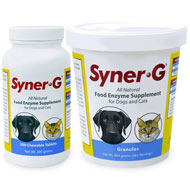The Importance of Nutritional Supplements
 | Aside from receiving regular meals, most aspects of dog nutrition are often overlooked in spite of its great importance. Just as many humans need supplements to maintain their health, dogs need them to to maintain shiny coats, active brain functionality, strong joints, and a healthy digestive system. Providing |
There are a wide variety of supplements on the market, and this market is expected to continue growing for the foreseeable future. So, with all the supplements available, one may wonder which are worthwhile and what benefits do they provide?
Because a dog's diet might lack certain vitamins and minerals and it is difficult to tell exactly which your dog needs, the most common supplements used by dog owners are multivitamins. Fatty acid supplements, which reduce shedding and improve the shine of a dog's coat are also popular, as are probiotics. Probiotic supplements help alleviate gastrointestinal problems and improve immune system function. Antioxidants that counteract cognitive dysfunction are also included in many supplements.
Your dog's food: Look for high-quality ingredients in your dog's food as opposed to relying on popular brand names. Check for filler ingredients and preservatives as these may indicate a lower-quality of ingredients, which likely lack the nutrients that are vital to a dog's health. Organic dog foods are among the most popular because their ingredients are generally rich in nutritional value.
Vitamins and minerals: A healthy dog diet includes Riboflavin, Niacin, and vitamins A, D, E, K, B6. Healthy diets also include a balanced ratio of Omega 3 and 6 fatty acids, which help keep allergies under control and protect against harmful elements in the environment. Additionally, Omegas promote alertness and healthy, shiny coats; they also counteract itchy skin and stomach problems. Iodine helps a dog's thyroid gland function optimally and zinc partners with red blood cells to remove carbon dioxide. Administering nutrients that meet these minimal requirements should eliminate dermatological irritations and other health problems experienced as a result of dietary deficiencies.
 |  |  | |
| Omega-Caps For CATS & SMALL Dogs | Omega-Caps - For MEDIUM Dogs | Omega-Caps ES - Extra Strength For LARGE and GIANT Dogs | Omega-Caps ES - For Large & Giant Dogs |
Fatty Acids: These supplements protect and promote lustrous, shiny coats.
Weight connection: It is common for a dog lacking in nutrients to experience weight challenges. Dog food alone will not reverse this; maintaining proper nutrition is required while reducing the calorie consumption of your pet.
Knowing the importance of nutritional supplements can save your dog's life by meeting their nutrition needs. These supplements can also increase the quality of your dog's life and what better way is there to show our furry loved ones our appreciation? Start your dog on a multi-vitamin or ask your veterinarian which supplements might benefit your pup today!









